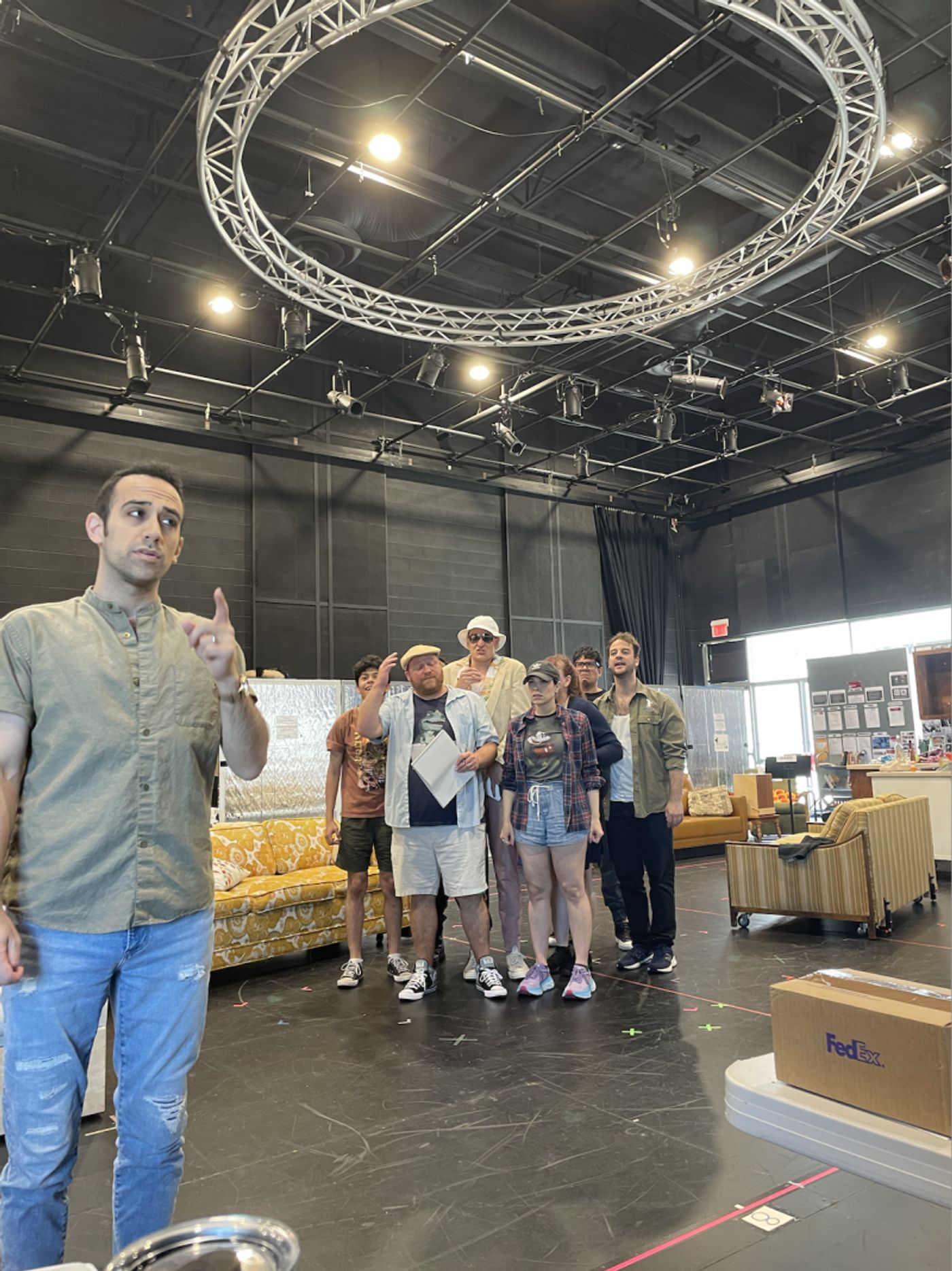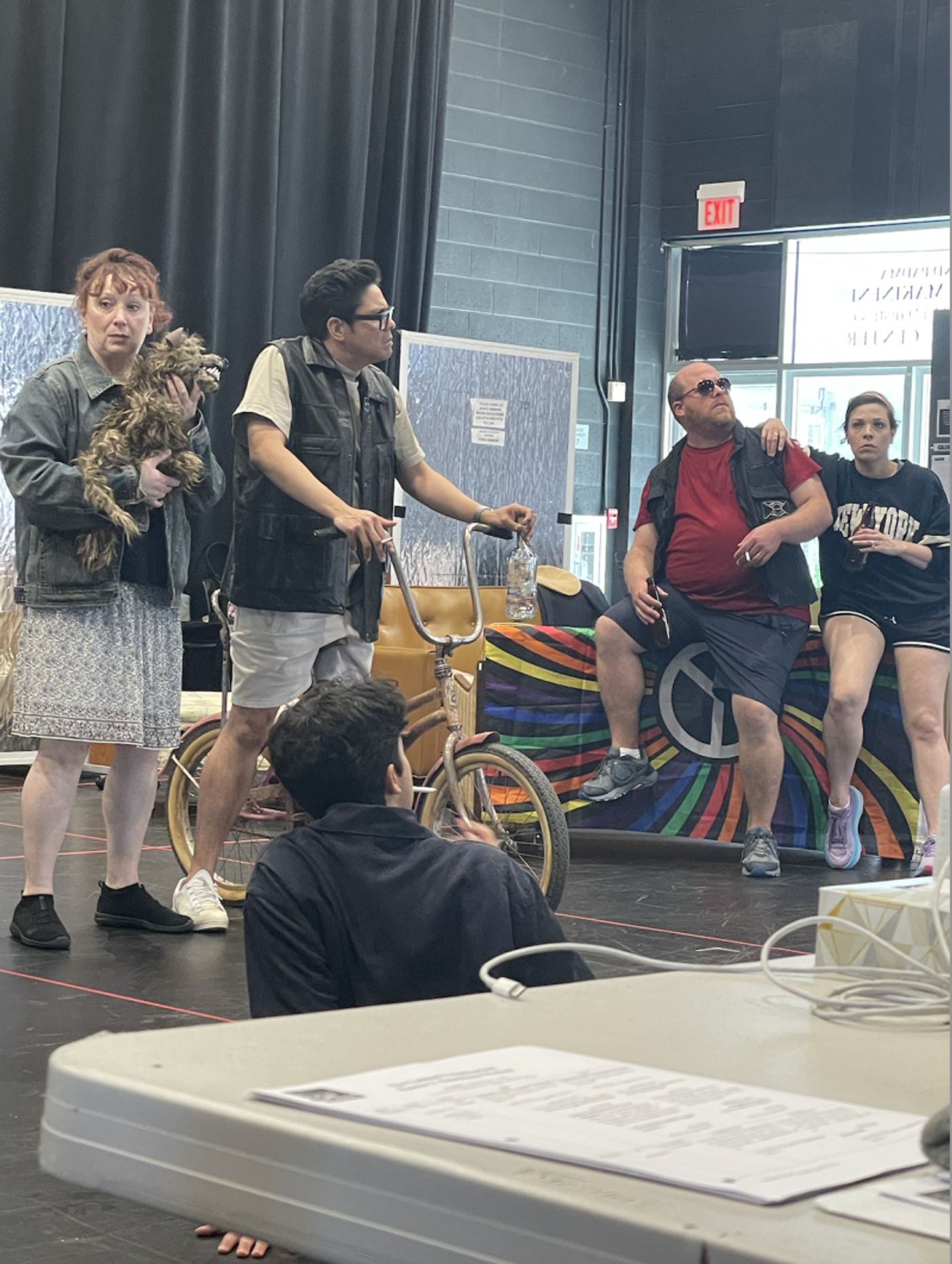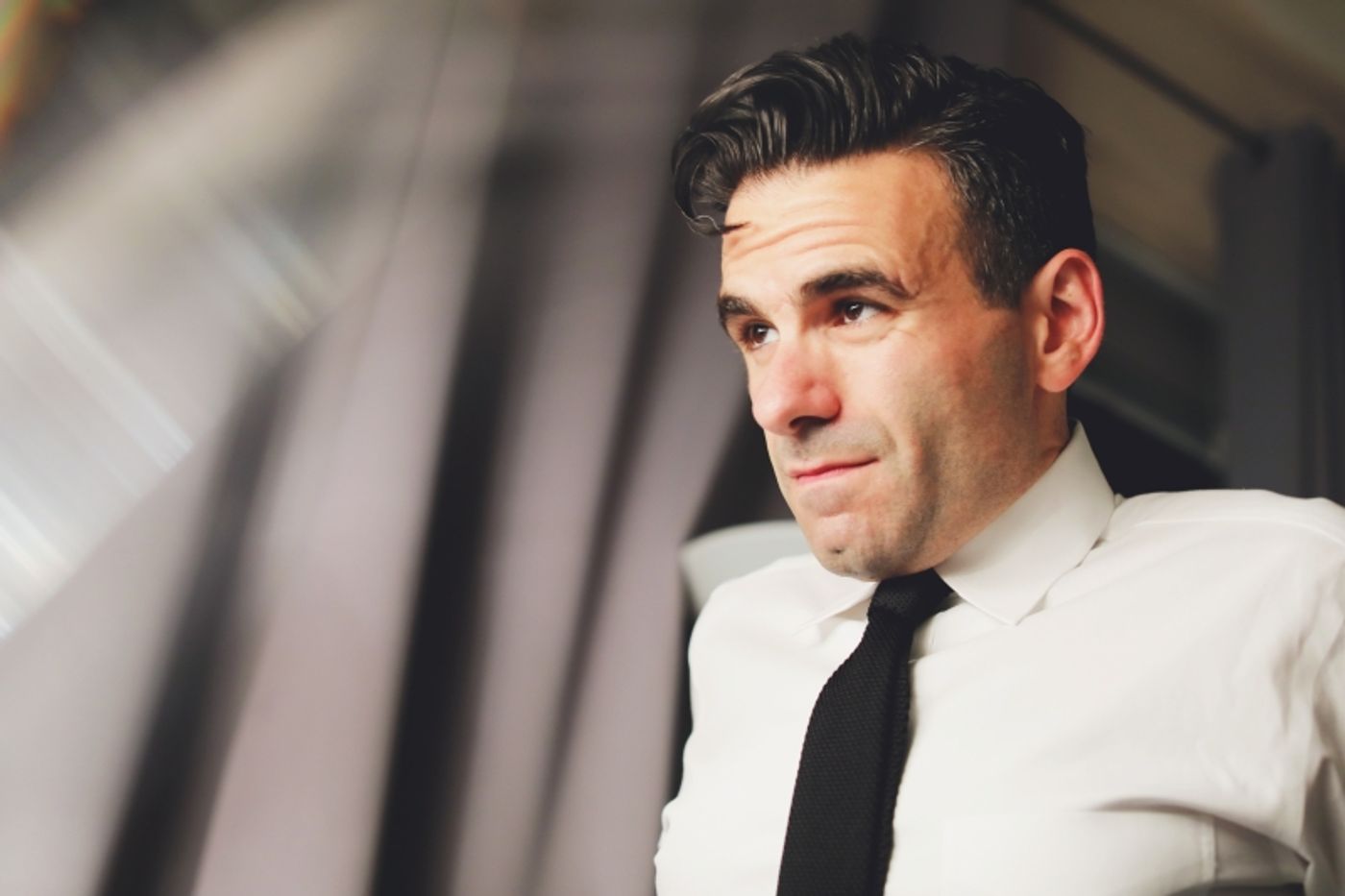Interview: How Joe Iconis Is Bringing Hunter S. Thompson's Story to the Stage in a World Premiere Musical
Discover the inspiration behind the new musical by Joe Iconis, and much more.
Joe Iconis, Tony-nominated musical theater writer and composer, has a new musical joining his impressive lineup of stage work, which includes Be More Chill, Love in Hate Nation, Broadway Bounty Hunter, Bloodsong of Love, Punk Rock Girl!, The Black Suits, ReWrite, Things To Ruin, and The Plant That Ate Dirty Socks and We the People.
Iconis' latest work, The Untitled Unauthorized Hunter S. Thompson Musical, is currently having its world premiere at La Jolla Playhouse now through October 8. The production features music and lyrics by Iconis, book by Iconis and Gregory S. Moss, choreography by Jon Rua, and direction by Tony Award winner Christopher Ashley. The cast features George Abud as “Nixon,” Jeannette Bayardelle as “Jann,” Giovanny Diaz de Leon as “The Kid,” Gabriel Ebert as “Hunter,” Marcy Harriell as “Sandy,” Lorinda Lisitza as “Virginia,” Lauren Marcus as “Flower Child,” George Salazar as “Oscar,” Ryan Vona as “Juan,” Jason SweetTooth Williams as “Ralph,” along with understudies Summer Broyhill, Josiah Cajudo and Kürt Norby.
BroadwayWorld spoke with Iconis about the process of bringing The Untitled Unauthorized Hunter S. Thompson Musical to the stage, what audiences can expect to see and hear with the musical, his recently released album, upcoming performances, and more.
I would love to talk about the origins of The Untitled Unauthorized Hunter S. Thompson Musical. What was that first spark of inspiration to start writing a Hunter S. Thompson musical?
The first spark was being vaguely familiar with Hunter S. Thompson’s work. I first was turned on to his work by the 'Fear and Loathing in Las Vegas' movie that came out in the ‘90s. I was in high school when that movie came out, and I was really taken with it without fully understanding what any of it meant. I was a pretty sheltered kid, I never did drugs, I didn’t drink, I was a pretty sweet, quiet boy who loved only musical theatre and nothing else. And so, that movie, the drug experiences, and the rebel spirit of it was something I didn’t relate to at all in my own life, but I was so intrigued by it. It felt really dangerous, but it also felt like it made a weird kind of sense to me.
And so, I was always kind of aware of his work. I was never a Hunter S. Thompson superfan, but then in 2005 when he died, there were all of these firsthand accounts from people who knew him. And what I found so striking was that some of the accounts were stories and anecdotes that lived up to this image I already had of him in my head as this renegade, wild man, acid-taking lunatic. Other stories painted a really different picture, and they depicted this guy who just cared so deeply about his writing and believed so hugely in America being a place that needed to support outsiders. And so, these two versions of him felt like they were sort of at odds with each other, and I found that really compelling.
As I got into the specifics of his life and the details of his story I realized that there was not an immediate dramatic arc to his story because his life was really wild, and he was a really contradictory and complex man. His story didn’t fit neatly into the classic bio-musical arc that we’ve come to expect from pieces of art like this. And because he felt like such a complicated, challenging central figure, I was like, ‘In a lot of ways it’s a terrible idea to write a musical about Hunter S. Thompson, and so I have to write a musical about Hunter S. Thompson.
.jpg?format=auto&width=1400)
How did you approach the music for this? Where did you start and how did you go about finding the right sound for the show?
All of the shows that I’ve ever written, they sound really different from each other. I never quite understand when there are musicals by the same writer and they all sound exactly the same regardless of character, or time period, or vibe. A lot of the show is set in the '60s and '70s, so I definitely took inspiration from pop and rock music of that time period, but I was most interested in giving voice to the inner lives of the characters. And so, Hunter’s music sounds different than Richard Nixon’s music in the show, it sounds different from Jann Wenner’s music in the show. I really wanted the score to feel like a kaleidoscope that was representative of all of these different types of people, and these different types of Americans, really.
The story is this roller coaster ride, and it’s really dense, and it covers a lot of ground, there are 10 million characters, and I wanted the score to represent that. I wanted it to feel like this big, huge, fat, all over the place, almost overwhelming score. There is a ton of music in the show, tons of songs. If you had to put a label on it, at its most basic, you could call it a rock musical, but there is something really epic about the whole thing.
I would love to hear more about your collaborative process. What has it been like working with this incredible creative team and cast to bring this show to life?
It’s just great. I’ve been working on this show for quite some time. I was originally commissioned to write this musical in 2008, it’s definitely the show of mine that’s had the longest gestation period. I haven’t been actively writing it since 2008, but I’ve certainly been thinking about it since then. And so, in some ways it feels really loaded, every part of this developmental process feels like, “Oh my god, I have over 15 years of thoughts and ideas behind every moment, and I have to make sure it lives up to that.” And then, in other ways, it’s like any other process I’ve ever been a part of, it’s all fresh, and it’s all new. And so, it’s really about hunkering down and doing the work.
The great thing is I’m working with this team, with these collaborators who are just absolutely out of this world. So many of the people who are in this show and behind the scenes are people who I’ve worked with for years and years and years. They’re these artists I have really longstanding collaborations with, and it’s my favorite thing in the whole world. I love really being able to collaborate, especially with the actors. The collaboration that I have with people like Jason SweetTooth Williams, or George Salazar, or Lauren Marcus, Lorinda Lisitza, or Ryan Vona, you can’t fake it. You can’t fake having 10, 15, 20 years of collaboration, and it makes everything so much richer, so much better. They’ll hold me accountable for things, and I’ll challenge them, and it’s really great.
And then, all of the new people who have come on board, like Gabe Ebert as Hunter, George Abud as Nixon, or Chris Ashley who, this is my first time working with him. We’ve been working on the show for quite some time, but he’s not a director who I’ve worked with a ton. It’s been really exciting to see these people fold into the preexisting collaborations, and challenge and invigorate the pre-existing collaborations. It’s been a really thrilling process so far.

Why do you feel that right now is the time for a Hunter S. Thompson musical?
A lot of the things that Hunter S. Thompson wrote about, and a lot of the things that are depicted in the show at the heart of the issues, address people who feel marginalized, people who feel like this country is either not making a space for them, or actively trying to erase them. The idea of challenging the establishment, and this idea of people, specifically young people, being the ones who can change the world through their art and through their activism, is something that I feel like even though the events that are happening are in the late '60s and early '70s, it couldn’t feel more tied to what is happening today.
All of the stuff in the show surrounding Richard Nixon, who sort of functions as this all-consuming villain in our show- because Hunter S. Thompson hated Richard Nixon so much- it’s just impossible to look at Nixon, and to hear the things he said, and see the way that he riled up a certain type of person, and not make connections to Donald Trump, and so many of the people who are major figures in our political and cultural landscape right now.
And that’s something that organically happened. When I first started writing this show, or first started thinking about this show, I never could have imagined that America would be what it is in 2023. And I think the long process of the show is something that really helped it. Because for years I kept trying to change the show to have it be more explicitly in conversation with the political topic of the day. And so, Trump gets elected and it’s like, 'Oh, shit, now the show has to really directly reference Donald Trump and everything that’s going on there.' And then the pandemic happened, and then all of the social upheaval movements happened and it’s like, 'You know, there is no way that we can possibly have this show directly relate to what is going on in the country, and so, we have to get to the heart of these issues. We have to get to the things that were happening in the '60s and '70s that are still happening today.'
Aside from what the show itself is trying to say, and how the show is speaking to art having the power to change the world - which it does, and the show firmly believes that - as far as the landscape of musical theatre, it’s certainly different than anything else that’s out there right now. At the very least, it’s something that isn’t based on a big corporate property, it’s something made by people who really love musical theatre, and who are trying to celebrate the form, and push it forward. It’s something where the songs were written for the actual show, and I think that that immediately puts it in a place that’s really, really different from a lot of what is out there currently.

In addition to this musical, you have a few other exciting creative projects, one of them being your recent album, Album. It has 44 tracks and you worked with over 70 collaborators, what was that process like and how do you feel now that it’s been released into the world?
The process was really wild because we recorded it all during the pandemic. And it was something that I was really passionate about, making an album that is the same album I would have made had there not been a global pandemic, which meant not recording things in bedrooms or apartments, but recording things live in a studio. And so, we started doing that right as vaccines were starting to come out, so everybody was masked, not everyone was vaxxed because people were slowly getting them as we recorded the album.
So, it was really difficult and costly to make the album, but I’m so proud that we did it the way we did it because in addition to it being an album that I think is really good- or at least really representative of the work I’ve been doing for the last 15 years - it functioned as this weird kind of reunion. Because as people would come into the studio to record, a lot of times it was the first time I was seeing them since the pandemic had started. A lot of these people who I work with, we aren’t just close collaborators, we are very close friends. These people are my best friends in the whole world. And so, to have this reunion be part of this project that also involved finally recording songs that we also wanted to record for five, 10, 15 years, it sort of captured this magic that becomes a snapshot of a time in a way that I wasn’t really anticipating, but I’m so glad that we have it.
I think if you’re someone who enjoys musical theatre songs, I think that there’s got to be something that you like, because it’s three and a half hours for god’s sake. Hopefully there is one tune you enjoy on there!
You also have a performance coming up at the Bourbon Room with your band, what can people expect to see with that performance?
Yeah I do, I’m so stoked about it! When I do Family shows, they’re so big and have so many people, they’re really unwieldy, so it’s hard to travel them. This is only the second time we’ve ever performed in LA. The cast is a bunch of people who perform with me all the time, like George Salazar and Jason Williams, and Jared Weiss, it’s going to be a really great mix of people, and it’s going to be a classic Iconis & Family show. So, some of the songs from Album, a bunch of people from the Hunter S. Thompson musical. It’s the ultimate in between rock concert and cabaret-style show. It’s something that I feel a bunch of people told me last time they don’t get a lot of in LA. And so, I’m happy to bring our taste of rambunctious, New York City rock n’ roll musical theatre to the West Coast.
Do you have any final thoughts you’d like to share?
I also have a Christmas show that’s going to be happening at 54 Below. It’s my annual Christmas show we did for 12 years and then the pandemic cancelled it, and because of Covid stuff we haven’t been able to do it in the last few years. But we’re finally bringing it back this December. That’s going to be December 10 through the 12th at 54 Below, and that’s a big, huge holiday spectacular with a cast of 60, and Christmas songs, and Hannukah songs, and it’s a real downtown New York theatre tradition that I’m glad is coming back.

Videos

